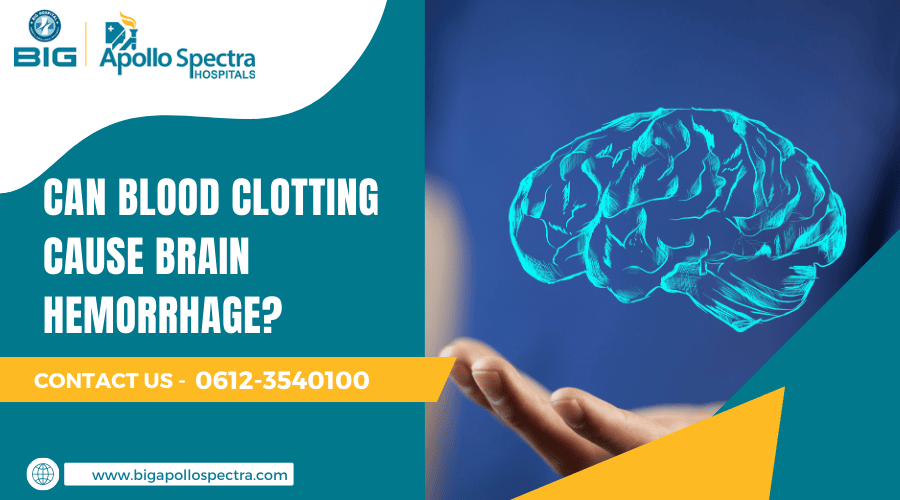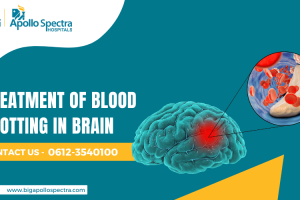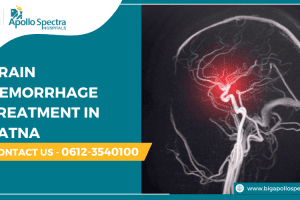Blood clotting plays a key role in stopping too much bleeding, but it can sometimes cause serious problems like brain hemorrhage.
A Blood Clot In Brain Recovery is necessary otherwise it can move to the brain and block blood flow leading to a hemorrhagic stroke. This situation needs quick medical help.
So What Is The Treatment For Blood Clot In Brain? Big Apollo Spectra Hospital in Patna is known for its top-notch medical equipment and best neurologist doctors in Bihar.
It offers full care, Medicine For Dissolving Blood Clots In Brain and the latest treatments for these life-threatening conditions.
Using high-tech tools and putting patients first, Big Apollo Spectra Hospital gives the best care possible. This leads to good results for people with brain hemorrhages and increases the Blood Clot In Brain Survival Rate.
How Does Blood Clotting Affect The Brain?
Blood clotting, or coagulation, is an essential process that helps prevent excessive bleeding when a blood vessel is injured.
However, this protective mechanism can sometimes go awry, leading to serious health complications, including brain hemorrhages. Can A Blood Clot In The Brain Lead To Death?
Understanding the relationship between blood clotting and brain hemorrhage is crucial for recognizing the risks and taking preventive measures.
What is Blood Clotting?
Blood clotting is a complex process involving various proteins and cells that work together to form a clot, stopping bleeding and starting the healing process. What Causes Blood Clot In Brain?
Well when a blood vessel is damaged, platelets (a type of blood cell) and clotting factors (proteins) in the blood respond by forming a plug at the injury site.
This process is essential for wound healing but can become problematic if clots form inappropriately.
What is Brain Hemorrhage?
A brain hemorrhage, also known as a cerebral hemorrhage, is a type of stroke caused by bleeding within the brain tissue.
This can occur due to various reasons, such as trauma, high blood pressure, aneurysms, or blood vessel abnormalities.
Brain hemorrhages can lead to significant neurological damage and can be life-threatening if not treated promptly.
The Link Between Blood Clotting and Brain Hemorrhage
While blood clots are typically associated with preventing bleeding, they can also contribute to brain hemorrhages under certain conditions.
So What Can Trigger A Brain Hemorrhage? Here are some scenarios where blood clotting can lead to a brain hemorrhage:
#1. Anticoagulant Therapy
Anticoagulants, or blood thinners, are medications prescribed to prevent blood clots in individuals at risk of conditions like deep vein thrombosis (DVT), pulmonary embolism (PE), or stroke.
While these medications reduce the risk of clot formation, they also increase the risk of bleeding.
If the anticoagulant effect is too strong, it can cause bleeding in the brain, leading to a hemorrhage.
#2. Blood Clotting Disorders
Certain genetic or acquired Small Blood Clot In Brain Symptoms can predispose individuals to both excessive clotting and bleeding. Who Are At More Risk Of Brain Hemorrhage?
For example, conditions like hemophilia (where clotting is impaired) or von Willebrand disease (a bleeding disorder) can increase the risk of spontaneous brain hemorrhages.
#3. Aneurysms and Blood Clots
An aneurysm is a weakened and bulging area in a blood vessel. If a blood clot forms within an aneurysm, it can cause the vessel to burst, leading to a brain hemorrhage.
The combination of a weakened blood vessel and clotting increases the risk of rupture.
#4. Hypertension and Blood Clots
Chronic high blood pressure can damage blood vessels over time, making them more susceptible to rupture.
So Is Blood Clot In Brain Dangerous? In some cases, blood clots can form within these damaged vessels, increasing the risk of a hemorrhagic stroke if the vessel bursts.
Preventive Measures and Treatment for Blood Clotting
Preventing brain hemorrhages involves managing risk factors and underlying conditions that contribute to both blood clotting and bleeding.
Here are some strategies for how Can A Person Recover From Blood Clots In The Brain:
#1. Regular Monitoring
For individuals on anticoagulant therapy, regular blood tests (such as INR tests) are crucial to ensure the medication is within the therapeutic range, balancing the risk of clotting and bleeding.
#2. Managing Blood Pressure
Maintaining healthy blood pressure levels through lifestyle changes and medications can reduce the risk of blood vessel damage and subsequent brain hemorrhages.
#3. Addressing Blood Clotting Disorders
Individuals with known blood clotting disorders should work closely with healthcare providers to manage their condition and minimize the risk of both clotting and bleeding complications.
#4. Healthy Lifestyle
Adopting a healthy lifestyle, including a balanced diet, regular exercise, and avoiding smoking and excessive alcohol consumption, can improve overall cardiovascular health and reduce the risk of brain hemorrhage.
What Is the Treatment For Blood Clot In Brain?
To wrap up, blood clotting plays a vital role in healing, but when it happens, it can sometimes cause serious problems like brain bleeding.
By managing underlying health conditions and adopting a healthy lifestyle, individuals can reduce their risk of experiencing this serious and potentially life-threatening complication.
This situation highlights why it’s crucial to get Best Neurosurgeon near me. If you’re in Patna, and looking for How To Remove Blood Clot In Brain Without Surgery contact Big Apollo Spectra multi-speciality Hospital.
The best neurology hospital in Patna provides top-notch healthcare, including cutting-edge tests and treatments for brain-related issues.
With its team of trained experts and modern equipment, Big Apollo Spectra Hospital gives patients complete care and backing offering them the best shot at getting better.





